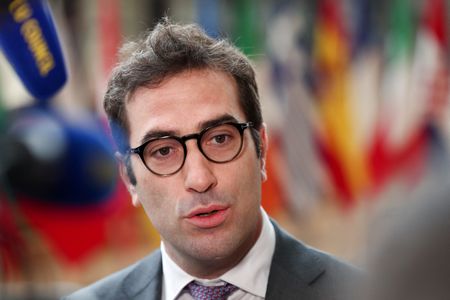By Patrick Wingrove and Emma Rumney
NEW YORK/LONDON (Reuters) – The U.S. Food and Drug Administration will ease requirements on nicotine pouch manufacturers under a new pilot program, internal meeting transcripts show, in the first clear sign of a softer stance on smoking alternatives under Trump’s White House.
The FDA has long applied rigorous tests to all new nicotine products before licensing them for sale in the United States, including requiring costly studies by manufacturers to detail the population-level effects of their products.
The FDA has wanted to ensure products offer a net benefit to public health by helping smokers switch away from cigarettes without creating new issues, such as a surge in youth use.
Under the pilot, however, the FDA will drop a requirement that manufacturers submit product-specific studies in several areas, according to transcripts of an internal meeting held earlier this month that were seen by Reuters.
SHIFTING TRUMP ADMINISTRATION STANCE?
Among the changes, manufacturers will no longer need to submit a previously required study of a product’s effectiveness in helping smokers cut back.
The FDA will instead rely on existing general research on nicotine pouches, which users insert under the lip to get a nicotine kick, to answer such questions, the transcripts show.
Reuters previously reported that the FDA was set to fast-track nicotine pouch reviews under the pilot.
On Thursday, the FDA confirmed some details of the program, such as more frequent communication with applicants and shorter review time frames.
But it did not outline the switch from product-specific to more general evidence in key areas.
While still only a test program, the move indicates a potential shift by the FDA towards relaxing aspects of a stringent review process considered to be among the primary barriers to doing business in the world’s largest market for smoking alternatives.
Tobacco giants like Philip Morris International, Altria and British American Tobacco have often waited years for the FDA to review their applications or in other cases had them rejected.
Those companies’ pouch brands Zyn, On! and Velo will benefit from the pilot.
BAT said it had long advocated for improvements to the review process and sensible regulation was key to Americans’ public health, while PMI said the programme is a “step in the right direction”.
Altria declined to comment before full details of the pilot were available.
FDA MAINTAINING SCIENTIFIC STANDARDS
During the meeting, Bret Koplow, acting director of the FDA’s Center for Tobacco Products, said the pilot may inform updates to the FDA’s review process for other product categories, the transcript showed.
Those categories include vapes, where the agency has so far remained more cautious.
Koplow did not respond to a request for comment sent via LinkedIn.
In response to Reuters’ questions, the Department of Health and Human Services, which oversees the FDA and is in charge of handling media requests for the agency, pointed to earlier comments by Koplow regarding the pilot program.
In that previous statement, Koplow said the CTP was not under pressure from the Trump administration or agency leadership to lower its scientific standards.
The Trump administration has ousted key officials at the center and clamped down on widespread sales of unregulated vapes. But, prior to the pouch pilot, it was unclear if it would respond to calls for a simplified review process.
NICOTINE POUCHES: RISKS VERSUS BENEFITS
During the meeting this month, FDA officials said that in general nicotine pouches were lower risk, exposing users to fewer toxic chemicals than other categories of nicotine products, and had so far not driven significant youth use.
Reuters briefed Mary Hrywna – an associate professor at Rutgers University, who has studied nicotine pouches – on the contents of the FDA discussions.
She said clearing new nicotine products for faster market launch could expand the availability of less harmful options for smokers. Whether it encourages them to switch is, however, another issue, she said.
Two former directors of the Center for Tobacco Products, meanwhile, maintained that product-specific studies were necessary to properly understand whether companies’ offerings deliver on expected public health benefits.
Brian King, CTP director until April, said even in relatively uniform categories like nicotine pouches, differences between products, such as nicotine content or flavor, can affect how they are used by smokers or adopted by new users.
King, who is now executive vice president for U.S. programs at the Campaign for Tobacco-Free Kids, declined to comment directly on Reuters’ reporting until details of the pilot program were confirmed by the FDA.
Mitch Zeller, CTP director until 2022, agreed that specific studies were needed to determine whether a product encourages smokers to cut cigarette intake to a low enough level to reap health benefits.
Based on the limited information on the pilot Reuters was able to provide, he said the program appeared to show a “cavalier” approach to youth use, given pouches could easily be used discreetly by young people.
Zeller pointed to the case of vapes, which saw a sudden surge in youth use in the past.
Two tobacco industry analysts said an easier FDA process would boost sales in the already fast-growing pouch category.
But Jessica Zdinak, CEO at consultancy ARAC, said that based on details in the transcript, clinical studies would still be necessary even under the streamlined pilot process.
This included what she called “one of the most time and resource intensive” studies currently required, meaning applications would still be challenging for manufacturers.
(Reporting by Emma Rumney in London and Patrick Wingrove in New York; Editing by Adam Jourdan and Joe Bavier)







